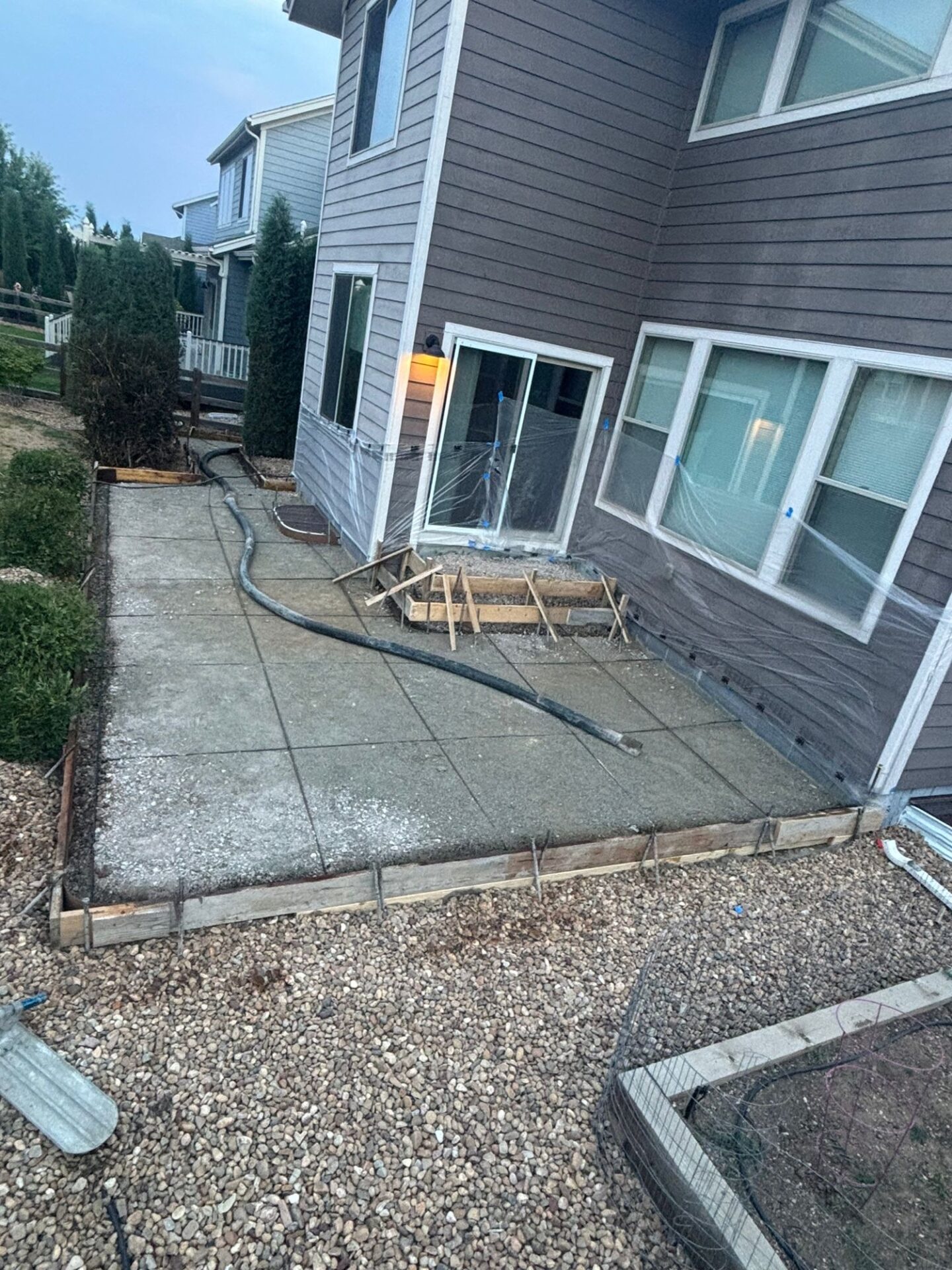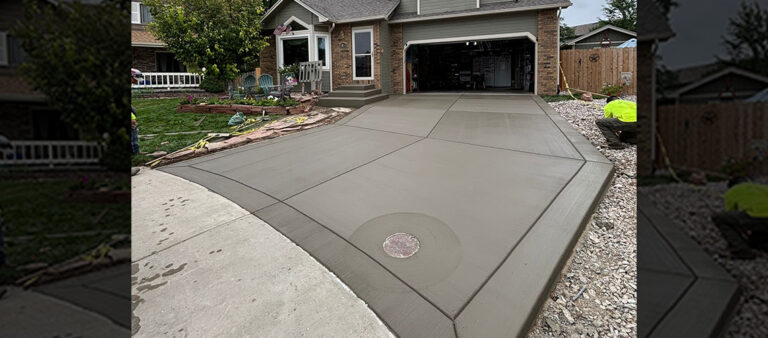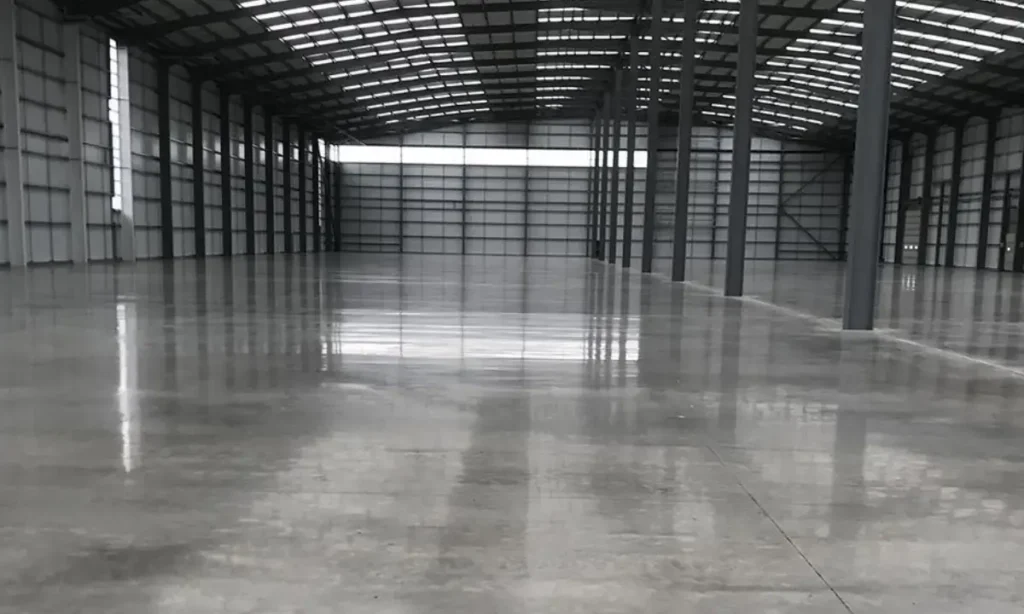Concrete is one of the most versatile and widely used building materials, and its strength is measured in PSI (pounds per square inch). Whether you’re building a patio, driveway, or foundation, understanding concrete PSI levels is crucial to selecting the right mix for your project. This guide will break down the different PSI levels, their applications, and why choosing the right one matters—especially for Northern Colorado’s unique climate.
What Does Concrete PSI Mean?
Concrete PSI refers to the compressive strength of concrete. It measures the material’s ability to withstand pressure without breaking. For example:
- A 3,000 PSI concrete can endure 3,000 pounds of pressure per square inch before failing.
- Higher PSI values indicate stronger and more durable concrete.
Common Concrete PSI Levels and Their Applications
1. 2,500 PSI (Light-Duty Concrete)
- Applications: Sidewalks, garden paths, and other non-load-bearing projects.
- Features: Affordable but less durable under heavy traffic or freeze-thaw cycles.
2. 3,000 PSI (Standard Residential Concrete)
- Applications: Patios, walkways, and basic driveways in mild climates.
- Features: Sufficient strength for areas with lighter loads but not ideal for harsh weather.
3. 4,000 PSI (Standard for Colorado Homes)
- Applications: Driveways, garage floors, patios, and foundations.
- Features: Offers excellent durability and resistance to cracking, making it perfect for Colorado’s freeze-thaw cycles and heavy snow loads.
4. 5,000 PSI (Heavy-Duty Concrete)
- Applications: Commercial floors, industrial driveways, and high-traffic areas.
- Features: Designed for projects requiring high strength and minimal maintenance.
5. 6,000+ PSI (Specialized Concrete)
- Applications: Bridges, skyscrapers, and other large-scale infrastructure.
- Features: Extremely durable but more expensive and not commonly used for residential projects.
Why 4,000 PSI is Ideal for Colorado Homes
Colorado’s unique climate poses challenges for concrete structures, and a 4,000 PSI mix is widely recommended due to its balance of strength, cost, and durability.
- Resistance to Freeze-Thaw Cycles
- Colorado’s temperature fluctuations can cause weaker concrete to crack.
- A 4,000 PSI mix withstands expansion and contraction, reducing long-term damage.
- Durability for Residential Applications
- Common residential projects like driveways and patios need concrete that can handle both weight and weather.
- A 4,000 PSI mix is strong enough to resist wear and tear from snow, ice, and heavy use.
- Water Resistance
- Higher PSI concrete is less permeable, minimizing water infiltration and the risk of freeze-related cracking.
How to Choose the Right PSI for Your Project
Selecting the correct PSI level depends on your specific project and environmental conditions. Here’s a quick guide:
- Sidewalks and Light Paths: 2,500–3,000 PSI
- Patios and Basic Driveways: 3,000–4,000 PSI
- Heavily Used Driveways and Garage Floors: 4,000 PSI
- Foundations and Load-Bearing Structures: 4,000–5,000 PSI
- Commercial and Industrial Applications: 5,000+ PSI
For personalized recommendations, consult with a trusted local concrete contractor who understands Windsor’s climate and soil conditions.
How PSI Affects Durability and Longevity
The higher the PSI, the more durable and long-lasting the concrete. Here’s how it impacts key areas:
- Crack Resistance: Higher PSI levels reduce the risk of cracks caused by weight or freeze-thaw cycles.
- Lifespan: Properly installed 4,000 PSI concrete can last decades with minimal maintenance.
- Weather Resilience: In areas like Windsor, Loveland, Greeley and Fort Collins where winter conditions are harsh, higher PSI concrete prevents water penetration and frost damage.
Concrete Additives to Enhance PSI Strength
Sometimes, additives are used to improve concrete’s performance or increase its PSI:
- Air-Entraining Agents: Improve freeze-thaw resistance.
- Fly Ash: Enhances durability and workability.
- Silica Fume: Boosts compressive strength for high-PSI applications.
- Fibers: Prevent cracking and improve tensile strength.
Frequently Asked Questions About Concrete PSI
Q: Can I use 3,000 PSI concrete for a driveway in Windsor?
A: While 3,000 PSI is suitable for mild climates, a 4,000 PSI mix is recommended for Windsor due to its better durability against freeze-thaw cycles and heavy snow loads.
Q: How is concrete PSI tested?
A: Concrete samples are tested in a laboratory using a compression machine that applies increasing pressure until the sample breaks.
Q: Does higher PSI mean more expensive concrete?
A: Yes, higher PSI mixes tend to cost more, but they also offer better durability and lower long-term maintenance costs.
Call to Action
Choosing the right concrete PSI level is crucial for the success of your project. For expert guidance and high-quality concrete services in Windsor and Northern Colorado, contact Hugo’s Concrete today. Whether you’re building a patio, driveway, or foundation, we’ll help you select the perfect mix to ensure durability and lasting value.





